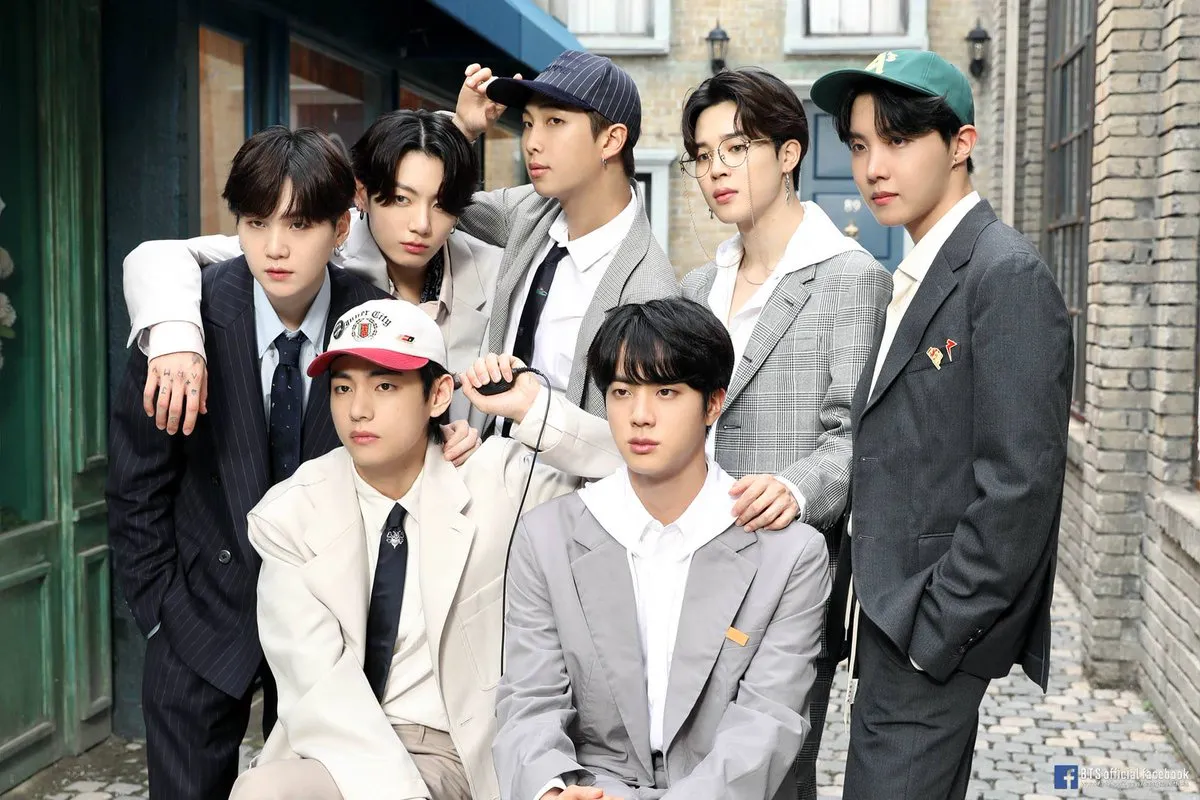Often, the name of a K-Pop group may look like a series of “random” letters, but they’re usually an acronym or have some deeper meaning. A lot of thought is put into a group’s name. And the same goes for that group’s fandom name. It might be a clever pun on the name of the group—like ONCEs for group, TWICE, and BLINKs for BLACKPINK. Or it might be something related to the group’s overall concept— like BUDDYs for GFRIEND.
BTS and ARMYs are no exception. So, if you’ve ever wondered why BTS’ fandom would call themselves ARMYs (or what BTS stands for in the first place), I am here to bring the knowledge that you seek.
Why are they named BTS?
Let’s start with the group themselves. BTS is an acronym, but they didn’t go with BTS just as a way to make you jump whenever you see someone posting about behind-the-scenes. The first and original meaning of the name, since their 2013 debut, is “Bangtan Sonyeondan”—meaning “Bulletproof Boy Scouts.” It’s why they’re also called “Bangtan Boys,” or even just “Bangtan”—especially within the fandom.
Its meaning is simple—BTS are the bulletproof shield of their generation, willing and able to defend them against any slander that might come their way. It’s also reflected in their official symbol, which does very much look like a shield—especially when combined with the complementary symbol for ARMYs. South Korea, like the rest of the world really, has a stark contrast between “older generations” and “younger generations”—a contrast that BTS highlights in their discography, making them the voice for millennials and zoomers everywhere.
Songs like “Baepsae”, “GO GO”, “Dope”, or even their debut song, “No More Dream”—talk about how the odds are stacked against young people, who are told to work harder, with an older generation assuming that a lack of success means that they’re lazy and entitled. The name was further explained by BTS member, J-hope, during one of their first post-debut radio interviews:
“It has a profound meaning. ‘Bangtan’ means to be resistant to bullets, so it means to block out stereotypes, criticisms, and expectations that aim at adolescents like bullets, to preserve the values and ideals of today’s adolescents”.
And sure, BTS aren’t adolescents anymore—but they have matured and their audience has matured with them, keeping them on the same wavelength as their problems shift from those of teenagers to those of young adults.
Once their popularity started spreading to the Western world, BTS also took on a second meaning, as a riff on “Beyond the Scenes.” HYBE, by then still Big Hit Entertainment, confirmed the name as the official English meaning of BTS’ acronym—as a way to “symbolize youth who don’t settle for their current reality and instead open the door and go forward to achieve growth.” The boys themselves were pretty happy with the new name, and they said as much on Twitter:
“We really like the new Brand Identity. We were really looking forward to it and we were eager to show it to everyone. […] More than anything it shows that ARMY and we, BTS, are connected as one and are filled with meaning that makes us feel good.”
What does ARMY mean?
ARMY is what the BTS fandom is called. And here’s why. First of all, with BTS’ imagery and sound relying heavily on symbols of fighting and battle, especially during their debut, it makes sense that their fandom’s acronym would fall within the same semantic area. ARMY is definitely a strong identifier for fans and solidifies their sense of belonging to the fandom—boosting that ever-important parasocial relationship that’s the Holy Grail of the K-Pop Industry. However, the name has its downsides too. The term ARMY and the military-related imagery have been used by the media to portray the fandom in a negative light—saying that BTS’ fans are like mindless troops rallying behind their faves without any hint of critical thought. But that’s the curse of being a young girl who likes a boyband, people are quick to make the fans out to be less valid or sillier than other artforms. It was true for The Beatles, NSYNC, Backstreet Boys, One Direction, and the list goes on.
That’s a whole other argument for another day, though. Let’s get back to the name ARMY. “ARMY” is an acronym as well. It stands for “Adorable Representative MC for Youth”—falling right into the pattern of BTS being voices for their generation and aiming to represent the young people of today and the struggles they face.
The full name hiding behind ARMY can stir up some funny moments within the fandom. When the game BTS World dropped—where the players act as BTS’ managers and have to get them ready for their debut—there was a part where the group had to choose its name. The manager had to suggest “Bulletproof Boy Scouts”—and some of the members are designed to be very skeptical of it in-game. The jokes about “I can’t believe they would complain about being called BTS when here I am, a whole Adorable Representative MC for Youth,” could not be counted.
Still, I suppose ARMY is much better than the other options on the plate. Last year, the boys revealed on The Tonight Show Starring Jimmy Fallon that “The Bells” was also being considered. Because both “bangtan” and “bangwool” (the Korean word for “bells”) start with the same syllable, they thought it would have been a nice link between the two names—and also a fun thing at concerts, what with asking bells to make some noise. “But thank God that it changed, ARMY is so much better,” Namjoon said. And what can I say but you’re right, Namjoon, as always.
(image: HYBE)









Published: Apr 14, 2022 03:02 pm